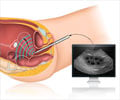During normal vaginal delivery, specific bacteria from mother are passed over to the infant which stimulate the infant’s immune responses. Cesarean birth prevents transmission of important bacteria to the infant. This is the wisdom behind increased frequency of chronic, immune system-related diseases in C-section born infants than babies born vaginally.//
Humans are born germ-free. Yet, birth is normally the time when vitally important bacteria start to colonize the body including the gut, skin and lungs. Researchers have long suspected that this early colonization sets the course for one's later health. It could be, however, that a cesarean section prevents certain bacteria, ordinarily interacting with the baby's immune system, from being passed on from the mother to the new-born. Paul Wilmes, head of the Eco-Systems Biology research group at the LCSB, and his colleagues have now found the first evidence of this in a study of new-borns - half of whom were delivered by cesarean section. Wilmes reports: "We find specific bacterial substances that stimulate the immune system in vaginally born babies. In contrast, the immune stimulation in cesarean children is much lower either because the bacterial triggers are present at much lower levels or other bacterial substances hamper these initial immune reactions to happen."
‘Specific bacterial substances that stimulate the immune system are present in babies born naturally, whereas these bacterial triggers are much lower in cesarean born infants.’
This bacterial colonizer-immune system link - together with other factors - could explain why cesarean section babies are statistically more prone to develop allergies, chronic inflammatory diseases and metabolic diseases. "It could be that the immune system of these children is set on a different path early on," suggests Paul Wilmes. "We now want to further investigate this link mechanistically and find ways by which we might replace the lacking maternal bacterial strains in cesarean-born babies, e.g. by administering probiotics."
"Of course, it is already clear that we should not intervene too strongly in the birth process. Babies should only be delivered by cesarean section when it is medically necessary", Paul Wilmes stresses. "We need to be aware that, in doing so, we are apparently intervening massively in the natural interactions between humans and bacteria."
Source-Eurekalert











